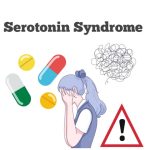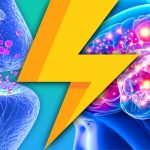How Serotonin Syndrome Ruined My Life!

What is serotonin?
Serotonin is a neurotransmitter. Neurotransmitters are chemicals used by your body’s nerve cells. These chemicals send signals that tell your body how to work.
Serotonin affects the brain and other body systems. It plays a role in many body functions. It affects your mood, sleeping habits, and even how hungry you are. Continuing research seeks to understand serotonin’s role. Low serotonin levels may be linked to depression.
What is serotonin syndrome?
Serotonin syndrome is sometimes called serotonin toxicity. The condition happens when people experience symptoms of having too much serotonin in the body.
Doctors first recognized serotonin syndrome in the 1960s, after the introduction of the first antidepressant medications. Today, more serotonin-affecting (serotonergic) medications are becoming available. At the same time, the incidence of serotonin syndrome appears to be increasing.
Most people can safely take serotonin-affecting medication under the guidance of a medical professional. Serotonin-affecting medications are commonly prescribed and effectively treat depression. When someone’s body processes serotonin differently (or it can’t process a large amount of serotonin), serotonin syndrome symptoms can occur.
What are the causes of serotonin syndrome?
Serotonin syndrome is a potentially life-threatening condition caused by excessive serotonergic activity in the nervous system. It is characterized by mental status changes, autonomic instability, and neuromuscular hyperactivity. Most reported cases of serotonin syndrome are in patients using multiple serotonergic drugs or who have had considerable exposure to a single serotonin-augmenting drug.
It can happen if you:
- accidentally use medications that are not suitable or at a dosage that is too high
- combine two drugs that boost serotonin
- intentionally take too much of a drug
Typically, the condition occurs when you combine two or more medications, illegal drugs, or nutritional supplements that increase serotonin levels.
For example, you might take medication to help with a migraine after already taking an antidepressant. Some prescription medications, such as opioid pain relievers, may also increase serotonin levels, according to a 2017 case report.
Serotonin syndrome is a potentially life-threatening condition caused by excessive serotonergic activity in the nervous system. It is characterized by mental status changes, autonomic instability, and neuromuscular hyperactivity. Most reported cases of serotonin syndrome are in patients using multiple serotonergic drugs or who have had considerable exposure to a single serotonin-augmenting drug.
How serotonin syndrome ruined my life!
The internet especially Reddit is replete with stories of how serotonin syndrome ruined the lives of several people. A Reddit user recently released from hospital after having a life-threatening case of ‘Serotonin Syndrome’ wrote “On Monday night I had taken my anti-depressant and tramadol (both prescribed), then after an hour I started having crazy tremors in my head, hands, and feet, then blurred vision, vomiting and falling over. After several hours of this, it calmed down enough for me to hold a phone to call an ambulance. Initially, the doctor in the emergency department was a complete novice to me, he thought I had taken an overdose of cocaine or MDMA and was lying about it.
He said ‘look, the sooner you tell us what you’ve taken the sooner we can treat you.’ I was having a hard time even talking the convulsions were so bad, and just said ‘I told you already! Tramadol and my antidepressant!’ By this stage, I had been convulsing for about 7 hours. At about 6 in the morning, the nurse said I suddenly stopped shaking, collapsed like a ragdoll and my eyes rolled up into my head, and was barely breathing. All I remember of this was having crazy hallucinations.
Eventually, a more-experienced doctor came in and was able to diagnose me with Serotonin Syndrome my meds had had a rare combined reaction that had built up for several months to the point where my brain had suddenly dumped a life-threatening amount of serotonin into my system. I finally woke up this afternoon after having my system flushed out with in-line fluids, and was sent home. So I have no memory after passing out until a few hours ago.
I’m doing this AMA so people can be aware of SS, it often goes misdiagnosed and can be fatal. The only reason I even went into the hospital was that when I started convulsing at home I decided to do a cross-check online of the possible dangers regarding various combinations of the medications I was on, and saw that my symptoms matched SS and the medications I was on.
When I told this to the first doctor, he did that look that says ‘Oh great, another patient who’s looked up their symptoms online and thinks they know everything.’ But the second doctor said it was a good call- if I hadn’t done that research, I would have passed it off as a virus (or having eaten something dodgy) and would have very likely been dead by now. AMA. I might be a little slow in answering since I am totally wiped out still from all the convulsions, and my brain’s a little spaced out.
The Tramadol was from a prescription a few months previous to when I started taking SSRIs, and I’m also on a long-term codeine prescription, which had started off the serotonin buildup over several days.
The single tramadol tablet brought it on to full SS, but the Doc said it only brought it on faster, it wasn’t the cause, only a catalyst. He said single tramadol isn’t enough to cause SS, it was most likely caused by long-term codeine use, which is a much rarer cause. Still, never mix your medicines, folks” he concluded.
Another user wrote “my SSRI is 20mg Citalopram (Celexa, Cipramil) I was actually prescribed co-codamol since Feb, they had been building the SS reaction up over a long period. I had built up a strong resistance to the codeine though, and my liver pain had gotten particularly bad, so I took tramadol (leftover from a previous prescription from before I was on the SSRIs) and that tipped the serotonin reaction over the edge. SS is rare with co-codamol but I shouldn’t have been prescribed them for so long (risk goes up with time), plus I shouldn’t have taken the tramadol without checking it was okay first. So the fault is both mine and theirs. A lesson for me to never mix meds, it was a very stupid thing to do, even though it was just ONE pill”.
Cases of serotonin syndrome resulting in hospitalization or death are rare. Most cases do not require medication intervention, but can be managed by stopping the drug or decreasing the dose. Mild toxicity appears to be rare but is likely under-reported, unrecognized, or confused with other syndromes.
What are the symptoms of serotonin syndrome?
You may have symptoms within minutes or hours of starting a new medication or having the dosage of an existing medication increased. The symptoms may include:
- tremors
- agitation
- anxiety
- restlessness
- disorientation
- sweating
- hyperthermia
- a rapid heart rate
- nausea
- vomiting
- muscle rigidity
- dilated pupils
- twitching, jerking, or muscle spasms
- a dry mouth and throat
- flushed skin
- increased bowel sounds or diarrhea
- shivering
- roving eye movements
- a stretching upward of both big toes on stimulation, known as the Babinski sign
In more severe cases, symptoms may include:
- loss of consciousness
- unresponsiveness
- coma
- seizures
In severe cases, it can be life-threatening. Symptoms tend to appear quickly after exposure to a drug. Most people who experience toxicity will develop symptoms within 24 hours, with 30 percent of symptoms appearing within 1 hour and 60 percent within 6 hours. For this reason, it is essential to seek help immediately if anyone shows symptoms that could indicate serotonin syndrome.
How To Prevent Serotonin Syndrome While Taking Medications
Serotonin syndrome is a rare but potentially life-threatening condition that can occur when taking medications that increase serotonin levels in the brain. Here are some ways to prevent serotonin syndrome while taking medications:
1. Inform your doctor: Inform your doctor of all medications, supplements, and over-the-counter drugs you are taking. Your doctor can help you identify any potential interactions between medications that could increase your risk of developing serotonin syndrome.
2. Follow dosage instructions: Follow the dosage instructions provided by your doctor or pharmacist. Do not take more of the medication than prescribed or take it more frequently than recommended.
3. Avoid mixing medications: Avoid mixing medications that increase serotonin levels in the brain. This includes other antidepressants, certain pain medications, and some herbal supplements.
4. Monitor for symptoms: Be aware of the symptoms of serotonin syndrome, such as agitation, confusion, rapid heartbeat, high blood pressure, dilated pupils, muscle rigidity, and fever. If you experience any of these symptoms, seek medical attention immediately.
5. Gradual dose changes: If your doctor needs to change your medication or dosage, they may recommend a gradual tapering of the medication to prevent sudden changes in serotonin levels.
6. Know when to seek help: If you experience any unusual symptoms or side effects while taking a medication, contact your doctor or seek medical attention immediately.
In summary, preventing serotonin syndrome while taking medications involves working closely with your doctor to monitor your medications, dosage, and potential interactions. By following dosage instructions, avoiding mixing medications, monitoring for symptoms, and seeking help when needed, you can reduce your risk of developing serotonin syndrome while taking medications.





